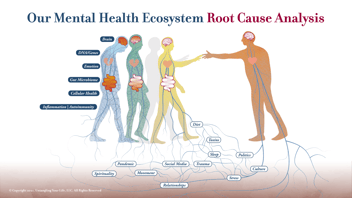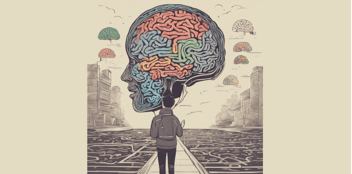I'm on Medication, Why Do I Need Talk Therapy?
- Home
- Blog

My Dear Reader
If you're someone who has embarked on a journey with medication to manage symptoms of mental health issues, you might wonder why many healthcare professionals also recommend talk therapy. After all, if the medication helps alleviate symptoms and improve functioning, isn't that enough? While it's true that medications can be incredibly effective in managing symptoms of disorders like depression, anxiety, and others, they typically do not address the underlying causes of emotional distress. This is where talk therapy comes into play, offering a comprehensive approach to mental health that medication alone cannot provide.
Understanding the Role of Medication
Medications are designed to help manage symptoms. For many, they are a crucial part of treatment, helping to restore healthier functioning in the brain by affecting neurotransmitter levels (serotonin, dopamine, and norepinephrine) and actions on receptors on the surfaces of the brain cells, all of which improves the functioning of circuits and systems in the brain. These effects can help to reduce symptoms and improve overall quality of life. This allows individuals to participate more fully in their lives and to engage in therapy more effectively. Keywords such as "medication for depression" or "anxiety medication" focus on these aspects, highlighting the functional improvements these treatments aim to provide.
The Limitations of Medication
However, while medications can be effective in providing relief, they do not delve into the interpersonal, intrapersonal, and intrapsychic dynamics that contribute to mental health issues. They cannot uncover unconscious patterns, nor can they explain the reasons behind the repetition compulsion—a psychological phenomenon where individuals repeatedly find themselves in similar toxic relationships or self-sabotaging scenarios. Medication cannot teach new coping strategies or help someone understand why they feel or behave the way they do. This is a significant limitation for those seeking not just symptom management but real, profound changes in their lives and their relationships with themselves and others.
The Power of Talk Therapy
This is where talk therapy comes into its own. Engaging in talk therapy, especially from a Root Cause Psychiatry™ perspective, helps uncover the root causes of emotional distress. Through approaches such as cognitive-behavioral therapy (CBT), psychodynamic therapy, or interpersonal therapy, individuals can explore their emotional patterns, identify and change destructive behaviors, and understand the deeper reasons behind their emotional responses.
Therapy addresses some of the "why" behind the symptoms, offering a space to explore one’s narratives, understand personal history, and transform insights into action. It allows individuals to work through unresolved conflicts, improve relational dynamics, and cultivate personal growth and self-awareness.
It Takes Courage to Enter Therapy and Stick with It
Therapy can be a challenging journey, one that requires not just time and patience, but also a considerable amount of courage. Facing oneself in therapy means confronting and tolerating feelings, memories, and truths that are often painful or difficult to accept. The process of delving into deep-seated emotional issues and uncovering the root causes of distress demands a willingness to be vulnerable and to endure discomfort. This path, while demanding, is also profoundly rewarding. Aristotle famously stated, "Knowing yourself is the beginning of all wisdom." This ancient wisdom underscores the transformative power of self-awareness that therapy aims to cultivate. Similarly, Socrates declared, "The unexamined life is not worth living," highlighting the essential role of introspection in leading a fulfilled and meaningful life. Both quotes emphasize the importance of self-examination and personal growth, central tenets of therapeutic work that, despite their challenges, can lead to significant insights and lifelong wisdom.
Integrating Medication and Therapy
For many, the most effective treatment involves a combination of medication and talk therapy. Medication can provide the necessary symptom relief to engage meaningfully in therapy, while talk therapy provides the tools and insights to address the underlying causes of distress and promote long-lasting change.
Conclusion
If you're considering medication, or are already on it, and wondering if talk therapy is also necessary, it’s important to remember that true healing often requires addressing both symptoms and their root causes. From a Root Cause Psychiatry perspective, combining medication with talk therapy offers the best of both worlds: symptom relief and a deep, transformative understanding of oneself and one’s relationships.
In conclusion, while medication is a vital tool in managing mental health symptoms, it is not a standalone solution. Engaging in talk therapy can significantly enhance your journey towards mental wellness, offering profound insights and lasting change that medication alone cannot achieve.
Lets Talk!
Talk therapy can significantly enhance your journey towards mental wellness.
.png?width=144&height=144&name=Untitled%20design%20(34).png)



